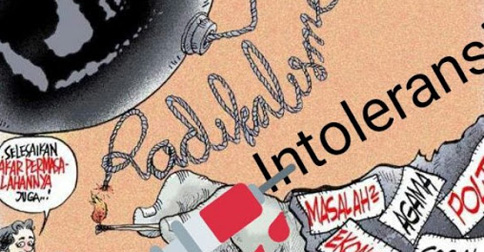Radicalism Is Still A Common Threat
By: Didi Anggoro) *
Radicalism is still a threat to the life of the nation and state. The spread is even more massive by utilizing technological sophistication so that it can infect anyone. The public is expected not to be careless and continue to anticipate the spread of the forbidden understanding.
In 2016, Indonesia was suddenly in an uproar with a viral broadcast on YouTube featuring 3,500 students from various campuses holding a national symposium on the Bogor IPB campus.
In the video, it was clear that the students present took the oath with their hands stretched out like ISIS style, thousands of students were led by a man from the stage.
In the video it was very clear the students shouted ‘we will continue to fight tirelessly, to uphold Islamic sharia in the auspices of the Islamic Khilafah state as a complete solution to the problems of the Indonesian people.
The video turned out to get a response from veterans who had once fought for Indonesian independence.
They said, that the younger generation might be forgetting, that Indonesia’s independence was not the result of a single class struggle. So, however, the veterans will still choose Pancasila as the basis of the state.
They also said, if the students were one vote with the veterans, don’t be afraid to awaken a handful of groups, because the veterans’ voices would remain the same, even though the veterans would be gone.
So it is fitting for the attitude of these veterans to be a reflection for all of us, that radical understanding does not discriminate. No longer a certain status, but also attacks young people in the sphere of education.
If this is allowed, of course diversity and Pancasila values will be damaged. If this happened it would be very sad, the veterans would be very sorry for it.
Of course we cannot ignore the environment around us. Irfan Amalee as the Director of Peace Generation said that the spread of radicalism was carried out in various ways.
One of the most visible is the use of political narratives. Young people who are experiencing an identity crisis will certainly see an injustice, it is easy to be encouraged to do jihad.
Radical groups will use historical narratives, namely the teaching of historical values that not arouse wisdom, but the value of revenge. Historical educators must make this one of their major homeworks.
In addition, the radicals also enter through religious narratives, they are able to make the youth’s turmoil to provide doctrine that has the opportunity to give birth to intolerance.
A number of radicalism actions that occurred in Indonesia were carried out in the name of religion. This happens because religion is most easily used as a tool for various purposes.
Of course people must be careful in involving religion in any case. Because, not a few parties who use religion to defend themselves and other purposes.
Acts of radicalism in the name of religion usually have nothing to do with religion. But there are other interests or problems behind it.
Of course we still remember, where adherents of radicalism are very frontal in the holding of the 2019 elections. All the narratives about the destruction of the state due to electing certain leaders are still often heard.
The spread of radical understanding can actually be prevented by affirming Islamic moderation in Indonesia, instilling a spirit of nationalism, an open mind and tolerance, being alert to provocation and incitement, networking in positive communities and peace and conducting religious activities with tolerance.
One threat that cannot be denied is the radical messages conveyed through the internet, especially social media, it can be a doctrine to lead public opinion.
we also cannot deny that with the fast internet flow, it makes it easier for radicals to spread their ideology. So that someone who will suddenly forbid this will be found is only based on studies on the Internet.
Former National Police Chief Tito Karnavian once stated that terrorists who carried out their actions in Medan, North Sumatra, learned radical ideas through cyberspace.
Internet users can get extreme understanding wrapped in propaganda in the form of anxiety narratives. The narration raises the perception of a threat that the world will deteriorate.
This narrative will certainly be peppered with a variety of things that have the theme of government failure politically, then spit it out into the audience with framing that the khilafah is the solution.
Of course we do not want Pancasila, which has become an ideology of the nation, undermined by an understanding that is incompatible with the culture of diversity. Radical understanding must be anticipated as early as possible.
) * Active writers in United Muslim millennial
